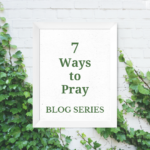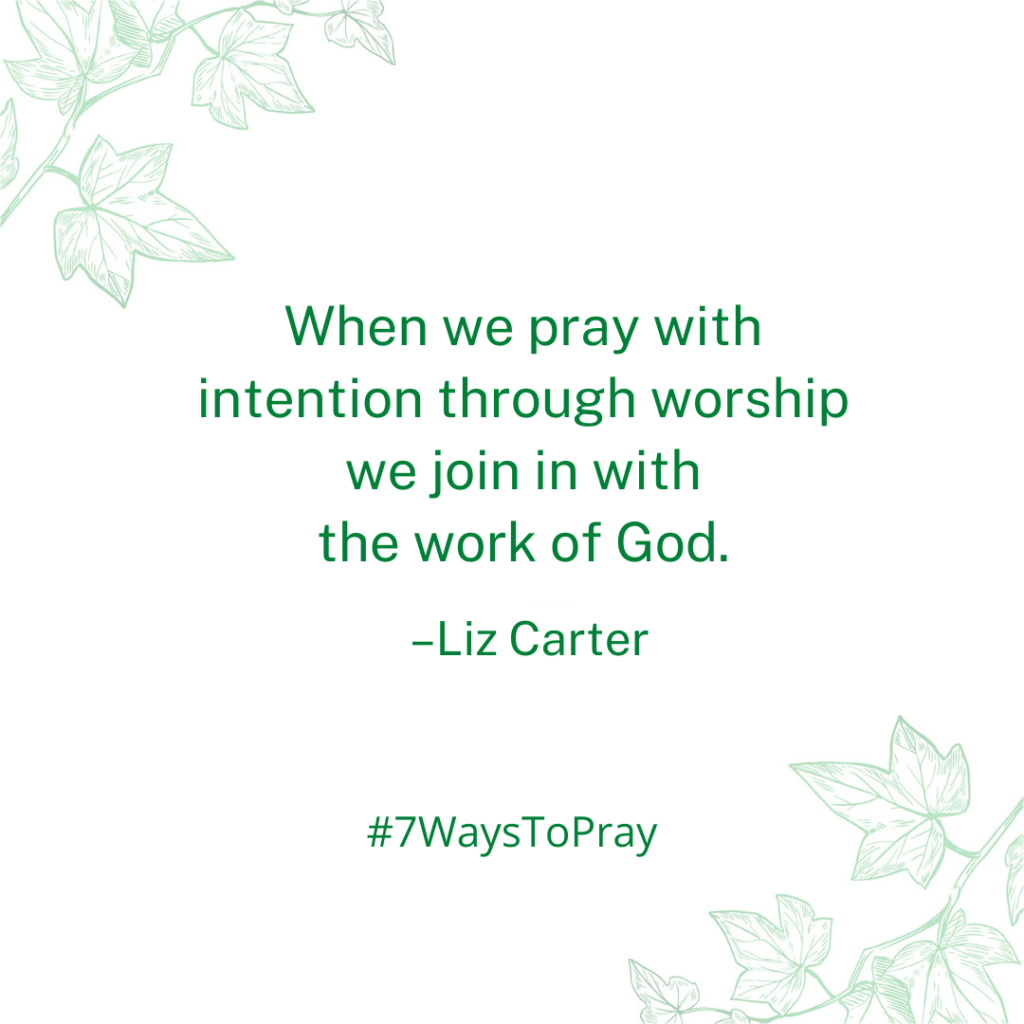
Watching Liz Carter during the pandemic via social media moved me as I wondered how she coped with shielding even from her own family over so many months. How did she not lose hope? One way was praying through worshiping, as she outlines in her powerful post. I’m grateful she shares with us the wisdom gained in the trenches.

The last couple of years have hurt, haven’t they?
For some of us, it’s been a time when we’ve felt like God hasn’t been around much. We might have suffered loss: bereavement or poor mental health; sickness or simply sadness at what has been happening around us; the polarised response around us.
Many of us have found prayer more difficult, with gatherings restricted and the effects of the pandemic on us as individuals. I had to shield for many months, living with long-term lung disease, and I struggled. I knew that prayer upheld me, but it was just hard.
I’d like to share today one particular way to pray I have found helpful – and transformative. I want to especially commend Amy’s book 7 Ways to Pray, which spoke into my life at a time I was finding prayer more difficult than ever, with some extremely challenging things happening in my own life. If you haven’t read it yet, do!
Praying through worship
We often separate worship and prayer. In church services, we have times of worship and times of intercession. But I’ve discovered something incredibly powerful about worship: it can be intercession. Last year, I was trying to pray about a certain situation, but I couldn’t find the words. I simply didn’t have the strength. But one morning, some of the lyrics in a particular worship song spoke clearly into my life:
‘I raise a hallelujah, with everything inside of me
(Raise a Hallelujah, by Bethel Music)
I raise a hallelujah, I will watch the darkness flee…’
The song goes on to encourage us to keep singing, even when we are in the middle of the mystery, even in the midst of fear, to sing louder than our unbelief and to see the melody we are singing as a weapon against the darkness around us. For me, these words packed such a punch because I couldn’t see my way out of the darkness and fear, I was trapped in the mystery and prayer left me grasping for words that did not come. I began to sing along, and became aware that I was praying, and my prayer was a deep one. I was praying these words over people I was praying for.
I continued to do this over the following weeks, finding a new sense of liberation in both worship and prayer. I listened to lyrics in a much more present and focused manner. In a time when I had nothing left, God intervened with a way to pray that not only renewed my prayer life, but also drew me closer to God as I prayed.
Nothing new under the sun
Over the centuries many believers have expressed their prayer through worship – from plainsong to the great hymns of praise, from worship choruses to poetic spoken word set to music. The Psalmists prayed with song all the time, and they prayed out all their feelings – their joys and their laments. I’ve always loved the Psalms as a place where we can find such honesty and raw sadness, decisions to remember what God is doing in our lives, and calls to keep praying despite the pain. Psalm 42 is such a song of extremes – lament, remembrance and praise, and for me it is a Psalm that touches the wild depths of me, the places deep down where pain smoulders and tears gather. It’s a Psalm that speaks when I am in great physical or mental anguish, speaking honestly of the writer’s sadness:
Why, my soul, are you so downcast?
Why so disturbed within me?
And then the Psalmist states his intention to keep on putting his hope in God:
I will yet praise him,
My Saviour and my God. (v5)
I’ve found those words ‘I will yet praise’ to be an explosion of power in my own life, and when I apply them within a prayer setting in worship, their potency is all the more vivid. And it’s not only that it feels like a good idea – I’ve seen God answer prayers in some incredible ways, even though they were not even prayers that I created. When we pray with intention through worship we join in with the work of God. We are noticing what God is doing, and then partnering with God in that moment.
It’s not that singing along to a song will immediately make us feel better. It’s more that, as with the prayer practices Amy shares in her book, we take that moment and make it about connection with God. We find God in what is happening in worship, and we apply that outwards to the situations we are burdened with.
Finding hope amid pain
For me, intercessory worship has been a beautifully hopeful part of a life of pain. When I am struggling for breath and bent over with pleurisy, I can’t always find words in myself. But when I listen to a song, I can catch the wider mystery of a God who works through so many different things, who weaves these things through our lives to encourage and uphold us.
I’d like to finish by sharing a prayer for those of you are finding prayer is hard because you are hurting.
For those who live under pain and darkness,
know the hope that is an anchor for your soul.
For those who live in brokenness,
know that love stronger than death
has already shattered the darkness.
For those who live under hurting and sorrow,
know that instead of mourning there will be joy,
instead of despair a garment of praise,
instead of ashes a crown of beauty. Amen.


Liz Carter is an author and poet from Shropshire. She writes about the difficult and painful times in life, and how we can find gold in the mess. Her books Catching Contentment and Treasure in Dark Places are available in online bookstores. You can find her at www.greatadventure.carterclan.me.uk. She’s signed a contract for her next book with The Good Book Company, coming 2023. She’s just brought out a new prayer journal which is filled with verses and poetry about creation.
Order 7 Ways to Pray here, including in the US, UK, and Australia. You’ll also find many resources for small groups – videos and a leader’s guide – here.
Leave a Reply